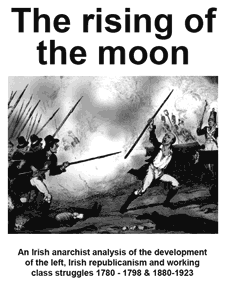Over 30 years of anarchist writing from Ireland listed under hundreds of topics
History
La Comuna de Paris
En 1871 Francia fue a la guerra con Prusia y fue derrotada. La cabeza del gobierno nacional era Adolphe Thiers, él tuvo que negociar los detalles de la paz con Prusia. Después de hacer esto tuvo que afrontar el problema de volver a controlar Paris, de convencer a la ciudad de que la guerra con Prusia había terminado y del desarme de la Guardia Nacional. A Thiers sólo se le permitían 12.000 soldados después de la tregua, y con ellos tuvo que hacer frente a varios cientos de miles de guardias nacionales.
In English: http://www.wsm.ie/content/paris-commune
Workers control and nationalism in Ireland in 1922
The Limerick General Strike of 1918 called the Limerick Soviet (workers' council) into being. This was the first incident to draw general attention to the new spirit developing amongst Irish workers. The Limerick General Strike was however a strike against the imposition of British military permits and though it was regarded with distrust in some Nationalist quarters, it was supported by numbers of Limerick employers and shopkeepers. That the Limerick Soviet was used by workers to bring down prices and force up wages was a fact overshadowed by the military permit question.
The 1907 Belfast strike
In 1907 Belfast saw the first big battle between the working and employing classes in Ireland. The dockers' and carters' strike was the spark which lit a fire of working class militancy. Workers were flexing their muscle, Catholic and Protestant were uniting, 'Larkinism' was giving the bosses nightmares. Even the police got caught up in the new mood and mutinied.
The laundry workers women’s strike that won paid holidays in Ireland
In 1941 a bill was brought before the Dail which would make trade unions pay for licences to negotiate on behalf of their members. Without a licence workers and their unions could be sued by employers for loss of profits if they went on strike. This blatant attempt at extorting money from unions was not taken well. The Dublin Trades’ Council, representing 60,000 workers, called the bill ‘a partisan attack on the working classes’. The Irish Women Workers Union urged opposition to the bill and on June 4th 100 shop stewards endorsed their union’s stand.
The rising of the moon
 A collection of Irish anarchist articles on the rebellion of 1798 and the 1916 insurrection brought together in a single 40 page PDF pamphlet which you can download.
A collection of Irish anarchist articles on the rebellion of 1798 and the 1916 insurrection brought together in a single 40 page PDF pamphlet which you can download.
The story of the Citizen Army
The playwrite Sean O'Casey was the first secretary of the Irish Citizen Army and in 1914 had drafted its constitution . He wrote this history of the Citizen Army in the period after the 1916 rising. By the time of the rising he had resigned from the ICA in protest at its decision to allow joint membership with the Irish Volunteers. O'Casey played no part in the rising although with other civilian men he was interned in the course of the rising.
No Wash protest ends - Hunger strike Begins! (1981)
A second Hunger Strike has begun, with Bobby Sands, who is serving 14 years for possession of a gun, refusing food on Sunday, March 1st. He will be joined later by others, including it is thought, 2 of the previous women hunger strikers from Armagh.
Anarchist Film Screening
Saturday 5th May 2007 - 4pm @ Seomra Spraoi, 6 lower ormond quay - blue door (ring the top bell).
( www.myspace.com/seomraspraoi )
Showing:
Ethel Macdonald: An Anarchist's Story
http://www.spanishcivilwarfilm.com/
Las Ideas de James Connolly
James Connolly es probablemente la figura más importante en la historia de la izquierda irlandesa. Fue un dirigente de la IWW en los EEUU, pero en Irlanda es más conocido por su rol en la construcción del movimiento sindical irlandés, en su fase sindicalista, y por involucrar al cuerpo de defensa armada del sindicalismo, el Ejército de los Ciudadanos Irlandeses, en la insurrección nacionalista de 1916. Esto dejó tras de sí un legado que, a veces, puede ser reclamado no solamente por todos los partidos de izquierda de Irlanda, sino que además por los partidos nacionalistas Fianna Fáil y Sinn Fein.
Early Irish communist - William Thompson - audio
William Thompson was one of the of the first people to critically engage with political economy and attempt to turn it around to defend the improvement of the condition of the working class and rural poor. He was from a Anglo- Irish landowning family from West Cork and was to become a leading figure in the early Co-operative movement. In this talk from the 2007 Dublin anarchist bookfair Paul Bowman talks about the importance of Thompson and the relevance of his ideas today

